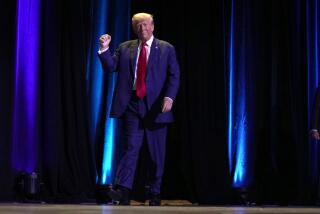Special Counsel May Be Biased, Deaver Charges
- Share via
WASHINGTON — Former presidential aide Michael K. Deaver charged Friday that independent counsel Whitney North Seymour Jr. may hold a grudge against him from a past political campaign and, for that reason--as well as previously cited constitutional ones--should not be allowed to prosecute his case.
In legal papers submitted to U.S. District Judge Thomas Penfield Jackson, Deaver said that Seymour, a former U.S. attorney in Manhattan who is now in private practice, once engaged in a legal fight with Citizens for the Republic, a Republican organization in which Deaver was prominent. The legal dispute occurred after Seymour had been defeated in a bid for the New York Republican nomination for U.S. senator in 1982.
Deaver’s attorneys, Herbert J. Miller Jr. and Randall J. Turk, told Jackson that there was a “suggestion of bias” in these events, which they said only recently came to their attention.
‘Backup’ Offer Rejected
Meanwhile, it was learned that Seymour has rejected a Justice Department offer of a “backup” executive branch appointment as independent counsel, which was intended to blunt the constitutional challenge that Deaver filed against him earlier.
Seymour could not be reached for comment, but a source familiar with the matter said that Seymour apparently believes that accepting such an appointment might erode his independence.
Another independent counsel, James C. McKay, who is investigating former White House political director Lyn Nofziger on conflict-of-interest charges, did accept a backup appointment Friday. Lawrence E. Walsh, the independent counsel in the Iran- contra investigation, had accepted a similar appointment Thursday.
The appointments were offered to convey the authority of the executive branch to the counsels. Each was named by special judicial panels to conduct their investigations under the 1978 Ethics in Government Act. Deaver and Marine Lt. Col. Oliver L. North, a key figure in the Iran-contra affair, have said that such judicial appointments are invalid because the Constitution vests the functions of prosecution and investigation solely in the executive branch.
Response Due Next Week
Seymour next week will file a response to Deaver’s challenge to his appointment as independent counsel, according to a spokesman.
Deaver’s lawyers, citing the constitutional argument, last month persuaded Judge Jackson to block Seymour’s announced plan to seek a four-count perjury indictment of Deaver, who has been accused of lying to investigators about his lobbying activities after he left government service in May, 1985. Jackson agreed with Deaver’s lawyers that the constitutional questions must be resolved first.
In the separate allegation of political bias that he filed Friday, Deaver said that he was an original steering committee member of the Citizens for the Republic and was a paid consultant to the organization before he joined the White House staff in January, 1981.
“In essence, these facts demonstrate that the independent counsel appointed to investigate Mr. Deaver had been engaged in a protracted and unsuccessful legal battle with the Reagan wing of the Republican Party . . . a battle that Mr. Seymour still was waging shortly before he was appointed independent counsel,” Deaver’s petition said.
Old Dispute Cited
Deaver’s attorneys said that Seymour, after his unsuccessful campaign for the GOP Senate nomination, declared in a civil suit and in papers filed with the Federal Election Commission that New York conservatives aligned with President Reagan improperly gave campaign aid to his opponent, state Assemblywoman Florence M. Sullivan, by using Citizens for the Republic as a conduit.
Seymour charged that the group understated on federal campaign reports the financial value of mailing lists that were furnished to his opponent for use in sending out “hate literature” that questioned Seymour’s loyalty to Reagan. He said also that the group concealed the source of the lists.
The allegations were rejected by federal courts and by the FEC, according to public records filed with Deaver’s brief.
Deaver’s lawyers, in raising the political issue, did not contend that Seymour’s proposed indictment was based on insufficient evidence, but they suggested that Senate confirmation should be required for special counsels like Seymour, “a process that almost certainly would have brought these newly discovered facts to light before Mr. Seymour’s investigation began.”
More to Read
Get the L.A. Times Politics newsletter
Deeply reported insights into legislation, politics and policy from Sacramento, Washington and beyond. In your inbox twice per week.
You may occasionally receive promotional content from the Los Angeles Times.










